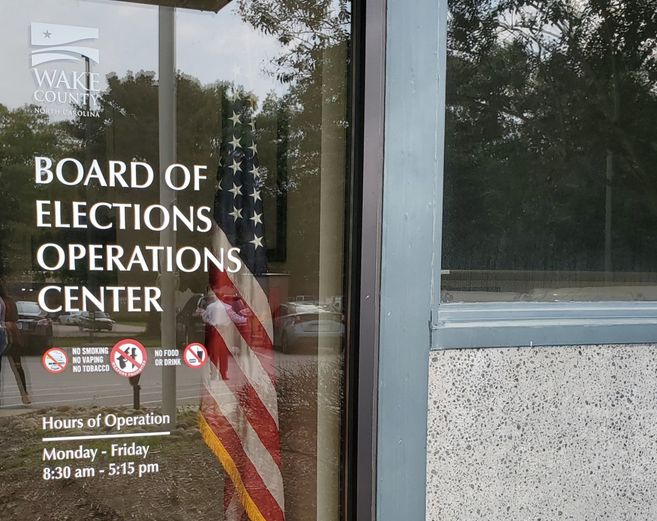North Carolina candidates and political committees recently filed their final campaign finance reports for 2023, disclosing who gave them money and how they spent it. A slew of news articles tell you who’s ahead in the fundraising horse race, but there’s so much more to explore in these reports. They offer a unique window into our state’s political culture. Here are eight examples, aided by a review of earlier reports and a little research. Look for more examples soon.
1. Disclosure reports show that Royce E. Everette Jr. and his family gave dozens of legislators and political committees a total of $74,800 in 2023. That’s more than most PACs in the state. The Everettes own Time Financing Service, a statewide chain of 25 small loan stores. Other store owners gave $113,200 in 2023 to bolster their ongoing effort to influence truth-in-lending laws and the fees they charge customers for fast cash and loans to buy cars, furniture, etc.
Despite Governor Roy Cooper’s veto, a controversial bill (Senate Bill 331) passed in 2023 to raise lending limits, hike interest rates, and change regulations for non-mortgage lenders of $25,000 or less. For good reason, the consumer finance industry has earned a reputation as a premier pay-to-play force in Raleigh. In 2010, it stopped donating to Democratic lawmakers and helped Republicans win control of the General Assembly – and then it demanded passage of favorable legislation, despite opposition from military base commanders and consumer advocates.
The industry put in more money throughout the next decade and GOP leaders pushed through more bills. Royce Everette’s family has invested $960,000 in state politics since 2010, and their business has gained millions in profits due to changes in state law.

2. Rep. Cecil Brockman (D-Guilford) has ignored multiple orders from the State Board of Elections to pay fines for filing his campaign disclosure reports late. The total due is only $1,200. By not paying, Brockman demonstrates disdain for the law and the public’s right to know what he does with his campaign money. His final report for 2023 activity is also late so he’ll soon receive another fine. That’s six late reports in a row, the worst record of any legislator. By one measure, Brockman also has one of the worst job performance records – he missed more than one-fourth of the votes the House held on legislation in 2023.

3. House Speaker Tim Moore (R-Cleveland) uses his campaign’s credit card to pay various expenses – but what is he buying? His campaign began itemizing the expenses on his disclosure reports after a critical audit by the State Board of Elections in 2015, but his latest reports indicate he has fallen off the wagon. In the last two years, he has charged more than $44,000 to the credit card without revealing what he’s buying. That failure to disclose expenses violates state law.
Moore has also pocketed more than $70,000 from his donors over the past four years by charging his campaign a monthly fee for using his law office, which is a renovated small house he owns in Kings Mountain. That excessive amount should also be against the law. Fortunately, only a few legislators besides Moore and Senate leader Phil Berger have used their donors’ money to pay themselves for office buildings they own.

4. David M. Powers, a lobbyist for various blue-chip companies, is prohibited by North Carolina law from donating to the campaigns of state legislators, but reports reveal that his wife, Shreita T. Powers, donated a total of $24,500 to 16 legislators in 2023. A few other lobbyists sidestep the ban against giving by having their spouse donate meaningful money, but none at the level of Powers.
Before he became a registered lobbyist in 2016, Powers was vice president for state government relations at the tobacco giant Reynolds America. As the boss of lobbyists, but not a lobbyist himself, he freely donated tens of thousands of dollars to legislative and executive branch candidates each election cycle. But that stopped after he registered as a lobbyist, launched Powers Strategies, and took on Reynolds and other firms as clients.
At that point, Shreita Powers suddenly became the big donor. Reports show that she has contributed $184,000 to NC candidates and political committees since 2016 (none of it to Democrats), compared to $10,100 in the previous 20 years. David still gives thousands to judicial candidates, which is permitted for lobbyists.
When Republicans gained control of the General Assembly in 2011, they chose David as one of their first appointees to the UNC Board of Governors; he served for 12 years, and in 2023 he was appointed a trustee of NC State University. Legislators also appointed Shreita to multiple terms on the board of the NC Museum of Art.

5. Jimmy D. Clark, president of a Greensboro-based crane and heavy hauling company, is another of the many political appointees who supply major money to state politics and who sit on boards that tilt state policies in their interests. Clark formerly chaired the NC State University Board of Trustees; thanks to an appointment by the NC Senate, he now serves on the UNC Board of Governors. Clark donated $66,000 in 2023, including two donations of $6,400 each to Senate leader Phil Berger. Jimmy’s son, Lynn Clark, also gave Berger $12,800. But the limit was $6,400 per person in 2023. Berger’s reports show his campaign returned the excess contributions.
Since 2000, Jimmy Clark and his family have given $492,000 to North Carolina candidates and political committees. Following the pattern of many wealthy business leaders, nearly all the Clark family contributions went to Democrats before that party lost control of the General Assembly; after 2010, nearly all the money went to Republicans.

6. Senate leader Phil Berger (R-Rockingham) has likely transformed more campaign donations into personal wealth than any politician in recent memory. The total could exceed $300,000. Here’s how:
In addition to the housing payments he received as a legislator, Berger used $73,500 of his campaign’s money to buy a townhouse in Raleigh that he then sold to a lobbyist for an additional $80,000 gain. After the sale, he began using his donors’ contributions to buy a condo in Raleigh, until the State Board of Elections finally stopped the scheme.
Through his law firm, Berger also collected $117,300 from 2012 to 2020 by charging his campaign monthly fees for using his law office in Eden, even though campaign staff worked elsewhere.
Next, Berger formed a partnership with attorney Seth Woodall and moved into Woodall’s office building in Eden in mid-2020. Berger’s campaign began paying “office rent” to Woodall Properties, totaling $82,500 by the end of 2023. The move also freed Berger to rent his old office to a tenant – a business owned by Woodall’s sister-in-law. It all looks like another scheme to convert campaign money into personal profit.

7. Seth Woodall (R) is now running in the crowded GOP primary for lieutenant governor, but campaign reports do not indicate that Phil Berger is mobilizing his donors to support Woodall. In fact, nearly all of Woodall’s 2023 donors live in his home county area, hardly a sign of broad statewide support. Donations listed include Woodall’s personal loan of $1 million and nothing from Berger’s family.

8. Rep. Destin Hall (R), chair of the House Rules Committee, is slated to be Speaker of the House next year, according to his colleagues. Here’s a riddle: Why did 14 executives from Rocket Mortgage choose to write $1,000 checks to just one legislator in early 2023 – Destin Hall? Rocket is the nation’s largest mortgage lender, owner of Quicken Loans and pioneer of online mortgages. The 14 executives, who live in Michigan and Tennessee, have never before donated to a NC legislator.
The company also created a state PAC a few years ago and hired top-rated lobbyists from McGuireWoods. The PAC had little activity until December 2023 when it sent donations to 13 legislators totaling $33,000. Rep. Destin Hall and Sen. Phil Berger got $6,000 each; four other GOP leaders each received $3,000.
When you see this pattern of sudden donations from out of state, coupled with high-priced lobbyists, you’d be right to wonder about pay-to-play corruption.







